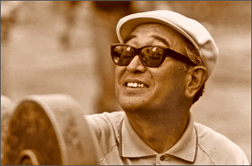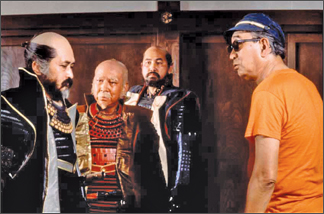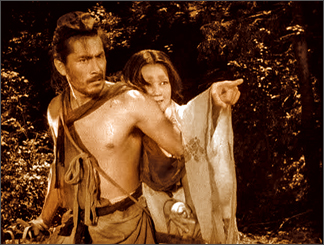Akira Kurosawa 100 "Genius survives. All else is claimed by death."
- Edmund Spenser
 By any account, Akira Kurosawa is a giant in the world of modern
cinema. When we highlight his birth-centenary, what, we do in effect, is
celebrating a whole sensational era of film history. This was an age of
cinema stalwarts. Sweden contributed the film genius Ingmar bergman -
the outstanding cinematic fiction creator. Satyajit Ray came from India,
with a lyrical vision of ordinary men and women, who attempted to cope
with life, as best as they could. Our own Lester james Peries introduced
his own form of cinematic story-telling, at a rhythm and pace that were
our own. By any account, Akira Kurosawa is a giant in the world of modern
cinema. When we highlight his birth-centenary, what, we do in effect, is
celebrating a whole sensational era of film history. This was an age of
cinema stalwarts. Sweden contributed the film genius Ingmar bergman -
the outstanding cinematic fiction creator. Satyajit Ray came from India,
with a lyrical vision of ordinary men and women, who attempted to cope
with life, as best as they could. Our own Lester james Peries introduced
his own form of cinematic story-telling, at a rhythm and pace that were
our own.
Rising above all those, Japan's Akira Kurosawa, established a
cinematic personality, that was eventually to "decree" a mode of film -
making, which exerted a pervasive dominance over a whole swath of the
film world. In this own country, his predominance was wildly recognized.
That is how, Akira Kurosawa came to be known by the sobriquet "Tenno" -
The Emperor. In his creative style he was imperious. He asserted his
directorial prerogatives, with a telling emphasis. All this was
exclusively in the interest of creative "perfectionism", for which he
was looked on with awe.
Akira Kurosawa, emerged into global prominence, through a dual
revolution. he went counter to the gentle tradition of the indigenous
film - makers of his day. Their films were generally redolent of "rice
and green tea". The effect, they generated was mild and subdued,
reflecting the docile and restrained way of life of the men and women of
Japan.
 Akira Kurosawa's cinematic creations, sought a path outside this
tradition of film making. In his early career, he was slow to be
accepted by the people of japan. To them his works seemed non indigenous
- or even "western." For the West too, Akira Kurosawa seemed alien in
his cinematic statements. But, they found in his works a streak, that
was novel and could be adapted to their own film making, to give it a
fresh piquance. Akira Kurosawa's cinematic creations, sought a path outside this
tradition of film making. In his early career, he was slow to be
accepted by the people of japan. To them his works seemed non indigenous
- or even "western." For the West too, Akira Kurosawa seemed alien in
his cinematic statements. But, they found in his works a streak, that
was novel and could be adapted to their own film making, to give it a
fresh piquance.
Akira Kurosawa, emerged into high global profile in 1951. His "Rashomon"
was one of the entries for the Venice film festival. The judges sat down
to watch it-yawning-as an inescapable obligation. They had the notion,
that they were in for some kind of japanese film full of rubber
chrysanthemums.
But, when the initial scenes began to unfold, they sat up, awakened
into a startlingly fresh cinematic experience. "Rashomon" (the gate of
hell) orchestrated a theme, that was totally off the beaten track. As it
opens the film focuses on a group of persons, taking shelter under the
front porch of a cemetery. The heavy downpour whips those taking
shelter, with sharp cold winds. One of those, a wood cutter, starts
narrating a gruesome experience he encountered. From then on, the story
progresses in a flash-back.
The film opens with a prolonged pan.
The wood cutter dashes through the forest in sprightly steps. The
blade of his axe, flashes in the sun-light. With a sudden shock, that
takes him aback, he discovers the body of a murdered aristocrat.
Four witnesses appear to recount their versions of the tragedy. A
priest who had seen the aristocrat walking along, while his beautiful
wife rode a horse, laments the impermanence of life. He says; "life is
like a dew-drop on the edge of a blade of grass-utterly ephemeral." The
four view-points, including that of masago, the bandit, bewilder the
viewer, confused by the contradictions in those statements. What is the
truth? The reality is elusive. Nearly sixty years after its first
appearance, "Rashomon" still processes contemporary relevance.
His 1954 film, "Seven Samurai" (The seven Warriors) is upheld by
critics as the model action film, in world cinema.
"Seven Samurai" represents, consummate story telling in the medium of
cinema. In the preliminary segment of the film, the predominant episode
in the recruiting of Seven Samurai, to be taken to a village, where the
poor, undefended peasants are cruelly victimized by bandits. When the
harvest has ripened, through the sweat and tears of the miserable
farmers, the bandits invade, and take away the yield, intimidating the
helpless peasants. The Seven Samurai offer to protect the peasants,
accepting only their meals as their fee.
The sequences that follow are a classic, in cinematic portrayal of
armed confrontation under highly restricting circumstances. The samurai
rid the village of the plague of the bandits, suffering the loss of one
of their own companies. As they depart a warrior observes; "the peasants
always win'.
Hollywood, accepted this theme in "The Magnificent Seven". George
Lucas who ushered in a new phase of cinema through his "Star Wars'
series, has admitted the influence of Akira Kurosawa's film "The Hidden
Fortress" on Lucas epoch-making film achievement. In his cinematic
vision, Akira Kurosawa, was neither oriented nor western. He was
immersed in cinema. The audio - visual detail in his films, is witness
to his high cinematic contemplation.
 |
 |
| Kurosawa at work |
Scene from Rashomon
|
Actor Toshiro Mifune, was propelled into global prominence as a
distinguished film star, largely through the meticulous direction he
received under Akira Kurosawa. In one session to get his action
right,director Kurusawa, made him view over and over again, the visuals
of a prowling leopard.
Director Akira Kurosawa, received lavish encomiums from the world. he
was presented an Oscar award, for life-achievement. In his film "Ikiru"
(Life) he monuments a parable that should guide the path of the
generality of people, as they spend their allowed span of days on earth.
"Ikiru" focuses on a bureaucrat, whose monotonous routine, limits his
existence only to certain gestures of life. Suddenly, he is diagnosed as
suffering from cancer. It is then, that he is compelled to seek the
meaning of life. He immerses himself totally in the building of city
park for children. He achieves his aim and experiences the fulfilment of
life. In Ikuru, Kurosawa administers a telling blow, on the cruel
insensitive adamance of bureaucracy.
Akira Kurosawa linked the east and west through cinema. he used
violence as a means of introducing a cathartic release for mankind,
tortured by escalating frustrations. Akira Kursawa, had the special
privilege of being adored by "Super Stars" in the world of film
directors. Directors Francis Ford Coppola, George Lucas and Steven
Spielberg, promoted Akira Kurusawa, as a human asset. His cinematic
idioms, are universally adapted even by those who are not at all aware,
of their origin. In the world of cinema, he will always remain "Tenno" -
The Temperor.
The group of young film enthusiasts in the Colombo Film Circle,
deserves all the encomia they receive. Their CINEIST TEAM, celebrated
The Akira Kurosawa birth-centenary, with a souvenir, seminars and the
free screening of Akira Kurosawa's works.
Wherever cinema is taken seriously, the name of Akira Kurosawa, will
never fail to stir ways of adoration and admiration.
|

